If someone were to ask you how much you paid for your car, you might say that you still haven’t been able to pay it all off. Worse still, the payments are so high they’re crippling your budget. Car owners in this position can look into refinancing their car loans for some financial relief. Is this a good idea?

What Does Refinancing A Car Loan Mean?
If you are unfamiliar with the term refinancing, here’s a quick explanation. Right now, the current loan you have doesn’t work for you because of the payment plan, rates, or another issue. So, you have the option to replace your current scheme with another one. You aren’t getting rid of the debt. You still owe the same amount of money to the same people. Instead, you are simply refinancing the debt into a new plan that works in your favor.
Car refinancing isn’t uncommon because these vehicles are so expensive to purchase and difficult to pay back. The original car loan may have made sense when you were younger and had less income or bad credit. But, if you can find a way to change the scheme and get a better deal, isn’t that a better option? Well, there are pros and cons to the approach.
The Positives Of Refinancing A Car Loan
Let’s start with all the reasons you should consider refinancing your car with a new loan. There are risks, and we will get to those later. However, the right plan could prove to be beneficial in the long run. It all depends on the terms of the new loan and your current financial situation. There are three approaches here that can help.
1) Refinancing with lower monthly repayments
The first option is to look for a loan provider who offers a lower interest rate. You might think this is unlikely, but it depends on your current financial situation and credit score. If your score has improved since you took out that first loan, lenders may be more inclined to give you a lower rate. On paper, it might not seem like a massive drop if you go from 11% down to 9% APR. However, this can add up to big savings over time. Your monthly payments could decrease significantly, letting you budget better for other family expenses.
2) Refinancing with a longer repayment period
If you can’t get a new loan with a lower interest rate, you might be able to switch to a longer term instead. The overall cost may not change, but the monthly payment will once they’re portioned out over the new scheme. The longer the timeframe, the smaller the installments.
3) Refinancing with a longer repayment period and lower monthly payments
If you can find a deal that offers both of these benefits, it could pay off even sooner. On top of this, you could find that you pay off your debt a lot faster, depending on your current income and expenses. Refinancing is a great choice for those who took out a loan on a lower income but now have a high salary. You could pay off the loan much faster, while paying less interest, and be debt-free in no time.
It is also worth remembering there is sometimes the option to consolidate loans when refinancing. These plans are appealing to anyone who has additional loan payments to deal with. A debt consolidation loan can be more convenient with a single affordable payment. However, they don’t always have the best rates.
The Downsides Of Refinancing A Car Loan
These potential benefits make refinancing a car sound like a great idea. However, these plans aren’t risk-free and aren’t going to be suitable for everyone. Keep the following in mind before signing up for anything new.
1) The interest paid could still mount up over time
One of the biggest concerns is that the new loan will have a higher interest rate long-term because of the longer payment plan. You might get a reduction in the basic rate, but the interest on those extra months could cancel out the benefits. This is why it is so important to understand all the costs and figures in advance and calculate the full expense over the determined payment period.
2) You might have additional fees to deal with
On the subject of extra costs, there are also the fees that come with a new plan. If you’re working with your current provider, this might not be so bad. There may be some admin fees or basic costs to transfer the loan into the system. If you switch to someone new, there may be additional application fees and other handling fees. Again, it helps to add up all the potential costs before committing to a plan.
3) You could end up paying more than the car is worth
Finally, there is one final issue with all this work to extend a car financing plan and the increased costs long-term. The amount you pay overall could be higher than the cost of the car. This is known as going upside-down on a loan. It isn’t a problem as far as your provider is concerned. Still, it can be demoralizing to realize that the costs aren’t going away while your car depreciates in value.
Is Refinancing Your Car Loan The Right Option For You?
The pros and cons here are significant, and you need to be sure before signing on any dotted lines. Once you’ve agreed to those new terms, payment installments, and interest rates, you’re locked in. So, take some time to go over the options available to you and see if they make sense financially. Can you get a low enough interest rate to bring the costs down in your favor? Are the longer payment schemes beneficial or just going to drag the problem out further?
Don’t assume that refinancing a car loan is the perfect solution to your problems. But don’t write off the idea either. Do your homework on suitable providers. Do the math to calculate the costs. Make sure everyone is on board with the final decision.
Tradersdna is a leading digital and social media platform for traders and investors. Tradersdna offers premiere resources for trading and investing education, digital resources for personal finance, market analysis and free trading guides. More about TradersDNA Features: What Does It Take to Become an Aggressive Trader? | Everything You Need to Know About White Label Trading Software | Advantages of Automated Forex Trading

































